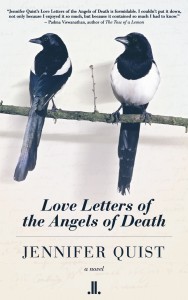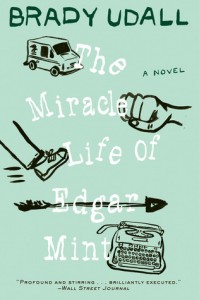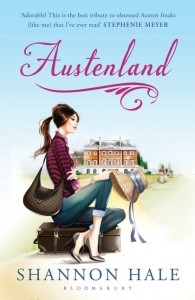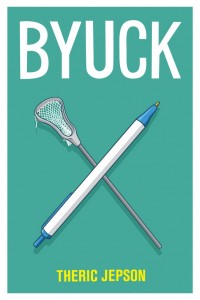This is the fifth “New Voices” collection of reviews from Shelah Miner’s Mormon Literature students at BYU-Salt Lake. These four reviews are from the second assignment, reviews of “literary novels” by Mormon authors. The reviewers are Jenna Rakuita (Austenland by Shannon Hale), Mckenzie White (Love Letters of the Angel of Death by Jennifer Quist), Kyleigh Pay (BYUCK, by Theric Jepson), and Ray Feinga (The Miracle Life of Edgar Mint by Brady Udall). Please be encouraging towards the students, most of whom are new to college-level writing assignments.
Reviewed by Jenna Rakuita
It is a truth universally acknowledged that a single woman must be in want of a man. But not just any man: a snobbish and haughty English aristocrat who does not associate himself with the lower class. This man is known as Mr. Fitzwilliam Darcy (swoon!).
Darcy.
Mr. Darcy.
Mr. Fitzwilliam Darcy.
Just the sound of his name makes women want to powder their nose, and search for the perfect man. Oh, could he really exist? The hopeful always seem to ask themselves on, yet another, Friday night spent alone. Shannon Hale has created the picture perfect destined-to-be-a-spinster-for-life character in Jane Hayes: a thirty-something New Yorker with a terrible secret. A dirty, little, rotten secret that has been following her around for far too long.
And she hides it (in her house plant, of course).
Jane is obsessed with “Pride and Prejudice”, or more specifically the BBC, double DVD version, starring Collin Firth as the “delicious Mr. Darcy” The obsession took control of her love life, or, rather, lack thereof. For nothing, and no one could compare to Mr. Darcy.
Jane once went out with a man named Jimmy. The romance was blooming beautifully, until one fateful spring morning Jimmy laughed, and snorted! “What’s wrong with that?” Jane wondered, “Absolutely nothing. It should be a cute idiosyncrasy in the man you adore, but it stung Jane like a hornet, ‘til she sat up in bed at two A.M. and thought aloud, Mr. Darcy would never snort.”
Jane had watched “Pride and Prejudice” so much that her fantasies began to feel like a reality. She was waiting for a fictional character to arrive and confess his undying love to her.
So, when Jane’s perceptive Great-Aunt comes to visit, she calls her out on her outlandish fantasies by telling her that each time the men in her life disappoint her, she lets Mr. Darcy in a little bit more.
Though Great-Aunt Carolyn was only present in the first few chapters of the book, she said, perhaps the most significant line in all of the 196 pages. She told Jane, quite boldly, “I’m old and rich, and people let me say whatever I want. So here it is. Figure out what is real for you. No use leaning on someone else’s story all your life. You know, that book did Austen herself no good- died a spinster.”
Then, Great-Aunt Carolyn died. And in her will, she left Jane an un-refundable ticket to Austenland: where she would get to the chance to experience a Jane Austin worthy love story. “A tea visit, a dance or too, a turn in the park, an unexpected meeting with a certain gentleman, all accumulating with a ball and perhaps something more…”
As the story progresses, the readers are able to join Jane on her quest to find out what’s real. Ironically enough, Jane is able to find reality in a place far from anything but fantasy. Dressed in a corset and a bonnet Jane is able to discover herself.
Austenland was not just a cheesy, sappy, love-sick novel (though it was certainly all of those things); it was story about giving up, but not settling: giving up your dreams and fantasies for something real; something tangible.
The story presents two main male characters that capture Jane’s eyes. Martin, a servant, and Mr. Nobley, a seemingly stuck up and boring stiff who disapproves of Martin (sound familiar?)
Martin and Mr. Nobley are polar opposites. Martin is laid back, and seems to find his words easily; Mr. Nobley on the other hand has trouble understanding his feelings; at one point saying to Jane, “And here you are Miss. Erstwhile (Jane’s name in Austenland). You are infuriating and irritating, and yet I find myself looking for you. I would be grateful if you would send me away and make me swear to never return.” What a compliment!
As the story progresses, the readers come to find that there is much more to the flirtatious Martin and the closed-off Mr. Nobley than first meets the eye. Jane is left dancing dangerously close to the line that separates what is real with what is only make believe. At one point in the story, Captain East and Amelia Hartwright’s silhouettes are seen pressed against each other in the dim of the night, leaving Jane to wonder if their love for each other could be real in a world of fantasy. After all, as Jane says, “It is only natural to confuse truth with fantasy.”
During Jane’s time at Austenland, she makes several self-discoveries. For one, Jane realizes that she is nothing like the charming and witty Elizabeth Bennett whom she admires so much. She explains that even in a time and a situation where marriage was a necessity, rather than a mere desire, Elizabeth Bennett was able to enjoy life and search for love on her own terms.
One of the more humorous parts of the book was the fact that Jane called (practically) every man she ever came in contact with, an ex-boyfriend. And she had, exactly thirteen (not including a couple halves) that appeared at the beginning of every chapter. Shannon Hale even includes the juicy details about how each relationship crashed and burned, leaving the readers to better understand why Jane Hayes had found herself in love with a fictional character that couldn’t disappoint her. My personal favorite: “boyfriend #13, Juan Inskeep, Gay.”
Though, in the past, Jane has experienced terrible (emphasis on the terrible) luck with the entire male population, Austenland may just be her chance to start over; her last “hoorah!” before she leaves the unattainable fantasy behind her. Or perhaps, she may come to find her reality in the midst of the fantasy.
Austenland is a great novel for anyone looking for an easy and light read that will leave one feeling hopeful about love. Though I found myself wishing for more character depth, I enjoyed the story and found Shannon Hale’s writing witty and enjoyable; perfect for curling up with a blanket on, yet another, Friday night alone.
 Love Letters of the Angel of Death, by Jennifer Quist
Love Letters of the Angel of Death, by Jennifer Quist
Reviewed by Mckenzie White
This is an intriguing tale of a married couple experiencing life and death of loved ones. Brigham (“Brigg”), the narrator, recalls moments in both his life and that of his wife’s, Caroline. They face the challenging occurrence of Brigg’s mother’s death and having to arrange her funeral and deal with the formalities afterwards. This is one of several interactions with death they face, including family members, friends, and even those they barely know. Quist does not give these “life moments” in chronological order, Brigg remembers and retells them, even if the memories were those of his wife. Quist mainly tells the story of Caroline as she reacts to the death of grandparents, in-laws, strangers, and [spoilers removed]. While in between the recalling’s of these difficult times Jennifer Quist recalls other aspects of Caroline’s life that give the reader a better insight into her character. Like that of her driving her grandmother to the hospital in the middle of the night all by herself when she had fallen and broken her arm. Briggs says, “it’s a credit to your under-developed sense of compassion that you know to lean forward, taking hold of the small hand your grandmother uses to cover your own hand, trap like, pulling you into the hollow of her throat between the tendons of her neck.”
Quist draws her readers in with the way she formats her text by having Briggs, the husband, remember and retell many stories their lives, including Caroline before he had entered the story. She gives the text an intimacy by having Briggs speak to his wife in the second person: “Me and the baby – we’ve each changed your name. When we got married, I got you to abandon the surname you been known by for your first twenty-one years. And without a word the baby now demands that you call yourself something like ‘Mom’”. [Spoilers removed]. The readers can also be enthralled by the great and sometimes humorous details that the author depicts, like Caroline’s breast feeling like pebbles when she is breastfeeding her first child. Or that of her depiction of the ravens that live at the dump, “None of the birds on the trash mounds look anything but old and hoary. Maybe there are no such things as raven chicks and the birds just spring to life without any infancy –incarnated fully grown from tattered black garbage bags caught in tree branches and held there, rustling through enough winters to be blown into enormous shaggy birds.” Quist does well depicting death, grief and the struggles that can come from it in many different aspects. Such as of having to deal with paperwork and legalities or talking with family members and bearing the burden of announcing the death of one to others, even repercussion years later that still affect those close to the one that passed. Love Letters is not so much of a book of grief as it is showing the tasks and attitudes taken by those who have to bear the burden of another’s death. She also brings up other sensitive topics like the role of patriarchs in the home and finds humor in its controversy by the way Briggs and Carrie have an argument that Briggs cannot cut the umbilical cord of their child. Carrie tells him he is just going to have to understand and come to terms with the limitations of his gender. Although he may be the patriarch he had little role in delivering their child.
Although Quist is a Mormon author there is little reference to the Mormon culture, which was somewhat surprising since the topic was death and Mormons have specific beliefs on death. Although Mormon references were strongest at the end of the book with portraying [redacted] in an afterlife looking down and waiting for a reunion. Also referencing Joseph Smith and the spirit world were indicators that this is a Mormon author. Love Letters of the Angel of Death could be slow or boring at times, for example the story of Caroline and her high school boyfriend, which seemed unnecessary, or the mundane tale of moving to a rural town. Yet Quist would then revive the readers in a new chapter with a new remembrance of their lives.
Love Letters of the Angel of Death was overall an interesting read with different takes on how people have to deal with death in their lives. Also how the actions of others (like their siblings) impacted their own grieving and coping processes. In this short novel Quist brought to light the struggles, humor and everyday experiences of life and death.
Reviewed by Kyleigh Pay
BYUCK is a funny book that sums up the BYU experience. It starts out with an apartment of 4 boys whose goals mostly lead straight toward marriage. One of the roommates, Peter, is a dating machine who seems to ruin every first date so badly that he can never get a second one. Curses is the more peculiar of the bunch and is closest to the main character. Then you have X, who is engaged to be married and is rarely seen by any of the other roommates. Dave, the protagonist, is the most normal of the group. He is a return missionary from Southern California and is majoring in English. The last important character in this book is Ref, or Marjorie, who is Dave’s lifelong best friend from back home. This book shows their college experiences and challenges of finding their eternal companion while struggling through school and life.
Dave is the ultimate best friend for Ref, going to all of her lacrosse games and being her biggest fan. She spends a lot of time with both him and Curses doing a variety of weird things. Throughout the book Curses and Dave are writing a play about the BYU experience, which they call BYUCK. The play is a comical and strange epitome of the stresses and adventures of going to school at Brigham Young University. While they are doing this, they decide that they need to find their spouses so that they can write it as correctly as possible. Both of them go on dates and start their quest for a happy married life. Curses meets the girl of his dreams when his roommate almost breaks his nose and Dave meets his on a blind date. Unfortunately, Curses’ sweet girl moves to Texas and Dave’s friend-zones him when he quickly becomes too clingy. Sad and single, the two boys go back to writing about love in their plays. Curses soon pressures Dave, though, to open his eyes and realize that Ref is the perfect girl for him. After a lot of wasted time worrying about nothing, Dave makes a romantic gesture towards Ref that ends into a catastrophe. Quickly, though, things are made right and Ref welcomes his love with her own.
This book was very interesting. Reading from a boy’s brain was quite different for me. Although it kept me entertained sometimes, I felt it was often sluggish. There was a lot of unneeded information and experiences all throughout the book. The play they wrote throughout it had no purpose or benefits other than providing the title for the book. It was quite funny but that did not outweigh the boredom for me. It was as if the author wrote a lot of unneeded stuff and then quickly wrapped up the book in the last 20 pages. BYUCK was not my favorite book, although I did not strongly dislike it either.
I did like reading the random writings written after every chapter, they made me smile. I also liked the accuracy. I feel like Jepson did a great job of capturing the boring, exciting, and weird experience that it is to attend this college. The main character had a great sense of humor which made it fun to live his life.
It was more than obvious that the book is written by a Mormon author. Not only was this story placed at a Mormon college, but there were so many other examples of religion and faith in it. Dave talked about his church calling as a teacher, instead of calling the table in the living room a coffee table they called it a hot chocolate table, and when language was said other characters quickly rejected it. There are countless examples that show that Theric Jepson is a part of The Church of Jesus Christ of Latter Day Saints. BYUCK is great LDS literary fiction, and although it wasn’t my favorite, I still enjoyed reading a book like this for a change.
 The Miracle Life of Edgar Mint, by Brady Udall
The Miracle Life of Edgar Mint, by Brady Udall
Reviewed by Ray Feinga
Edgar Mint, a half-Apache boy, was run over by a mailman when he was seven years old, left for dead with his head crushed. The novel takes you through a detailed journey of his recovery and subsequent life. The trials and events he encounters are none that a child should endure. Edgar’s internal goodness shines through as he constantly debates with himself about doing the right thing. Abandoned by his parents and family, he find himself losing those who matter most to him but continues to have faith to search for the mailman to let him know he didn’t die. He feels that is his purpose in life. On top of the mishaps of his life, he deals with puberty and adolescent challenges too.
Edgar’s recovery in the hospital puts him in the path of a life long friend Art. Art is somewhat of a father figure to Edgar and tries to teach him. Edgar is known as the miracle boy and is kind of a super star at the rehab facility he is in. He is then sent to a school for Indian children where he has to deal with bullies and abuse. He finds his best friend Cecil there and eventually the two are split apart when two Mormon missionaries start giving Edgar lessons after finding him after an attempted suicide. Edgar is then placed with a Mormon foster family, where he learns not every family is perfect.
Brady Udall did a fantastic job telling the story of Edgar’s life. He used so much detail that I was able to envision everything in my head, down to the smells he described. I enjoyed this novel very much. It was constantly entertaining and the variety of characters kept me intrigued. The book was very relatable in the sense that many times in my life, I have fought inner demons to do the right thing. I know without the in-depth explanations, the ending would not have made sense. It did not drag on or got boring at any point.
I really liked Udall’s style of writing too. He switched from first person to third person points of view, but not so frequently as to lose you, just enough to get the idea of what was being portrayed. Throughout the book, when I thought I knew what was going to take place next, I was wrong. It often took a turn in the complete opposite of what I assumed would happen. It was unpredictable which I was happy with. I found myself hoping for something great to happen to Edgar and he just didn’t seem to catch a break, which was frustrating. You become invested in these characters and want the best for them, and although Edgar was progressing, I wanted more happiness for him.
I feel the moral of this book was perseverance and faith. So many times this kid could have given up, but he fought. He said, “In the last thirteen years I haven’t become any wiser or better or stronger. In many ways, it occurs to me now, I have lived my life in reverse. In the first half of my life I had to make all the hard choices and ride out the consequences, while in the second half I have lived the sheltered and uncluttered life of a child.” There are probably many young men who have lived lives like this, facing things most of us cannot fathom.
I highly recommend this book. You experience every emotion; fear, happiness, sadness, anger, hate, frustration, and love. Edgar is a memorable character, I think we all have a little Edgar P. Mint in us.



What an honor to be read by students. It was my “future ambition” in my high school yearbook. Would like to point out that the typo in the quote about ravens does not appear in the original book. I panicked and checked just now.
I fixed the Quist quote, and changed all the Jepsen’s to Jepson’s.
Thanks. High school fantasy now complete.
Udall’s novel is probably my favorite Mo-ish novel to date. That guy can write a sentence.
Theric, I’m pretty sure I mentioned that your book is in the “non-circulating” section of the library here at BYUH? Sorry if I repeat myself. What an honor though!
.
I do find it fascinating that church-school libraries buy my books and then store them where the kiddos can’t access them.